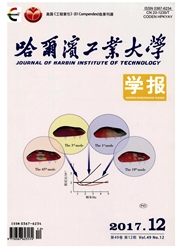

 中文摘要:
中文摘要:
针对具有惯性张量不确定性、外干扰及饱和限制的小型航天器非线性姿态跟踪问题,将反步法和系统浸入与流形不变理论相结合,提出了分块自适应约束控制结构。航天器姿态模型由修正罗德里格参数进行全局非奇异描述。在设计反步控制器时,引入指令滤波器和修正跟踪误差信号以施加系统状态和执行器的饱和限制,同时较容易地获得虚拟控制导数。为提高反步控制器的鲁棒性和性能,利用基于不变流形的非线性观测器对时变的系统“总干扰”进行在线估计补偿。由于不变流形方法使得估计误差具有指定的一致稳定动态,因而该分块自适应控制器比传统的自适应反步控制器更容易调节,且性能不受未知的估计律动态的影响。李亚普诺夫直接方法证明了估计误差有界性和闭环系统输入状态稳定。数值仿真表明,与传统方法相比,所提出的控制器结构具有更高的姿态跟踪性能和干扰估计精度。
 英文摘要:
英文摘要:
A modular adaptive controller is proposed for the nonlinear attitude tracking of micro-spacecraft in the presence of uncertain inertial tensor, external disturbances and saturation constraints, which combines the theory of system immersion and manifold invariance ( I&I ) and constrained backstepping. Firstly, the spacecraft attitude is globally represented by modified Rodrigues parameters. Then the backstepping controller is derived to implement any operating constraints and obtain the derivatives of virtual control easily by introducing command filters and modified tracking errors. To improve the robustness of baseline controller, the nonlinear estimator is constructed based on I&I to estimate and compensate the time-varying total disturbances on line. Because the I&I approach allows for prescribed uniformly stable dynamics to be assigned to the estimation error, the resulting modular adaptive controller is easier to tune compared to classical adaptive backstepping. And its performance does not suffer from unpredictable dynamical behavior of the estimation laws. The closed-loop input-to-state stability and boundedness of the estimation error are guaranteed by Lyapunov direct method. Comparative simulations state that the proposed controller is successful in achieving high attitude performance and precise estimation of disturbance.
 同期刊论文项目
同期刊论文项目
 同项目期刊论文
同项目期刊论文
 Efficient LMI-based Quadratic Stability and Stabilization of Parameter-dependent Interval Systems wi
Efficient LMI-based Quadratic Stability and Stabilization of Parameter-dependent Interval Systems wi A HOSVD-Based LPV Modeling and Mixed Robust H2 H∞ Control Design for Air-Breathing Hypersonic Vehicl
A HOSVD-Based LPV Modeling and Mixed Robust H2 H∞ Control Design for Air-Breathing Hypersonic Vehicl A prognostics-based spare part ordering and system replacement policy for a deteriorating system sub
A prognostics-based spare part ordering and system replacement policy for a deteriorating system sub L-infinity and L-2 semi-global stabilisation of continuous-time periodic linear systems with bounded
L-infinity and L-2 semi-global stabilisation of continuous-time periodic linear systems with bounded Global stabilization of switched stochastic nonlinear systems in strict-feedback form under arbitrar
Global stabilization of switched stochastic nonlinear systems in strict-feedback form under arbitrar Global robust finite-time stabilisation of unknown pure-feedback systems with input dead-zone non-li
Global robust finite-time stabilisation of unknown pure-feedback systems with input dead-zone non-li 期刊信息
期刊信息
